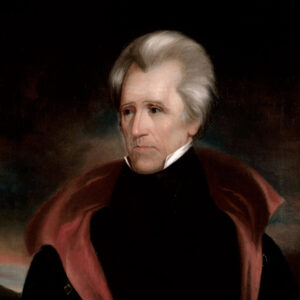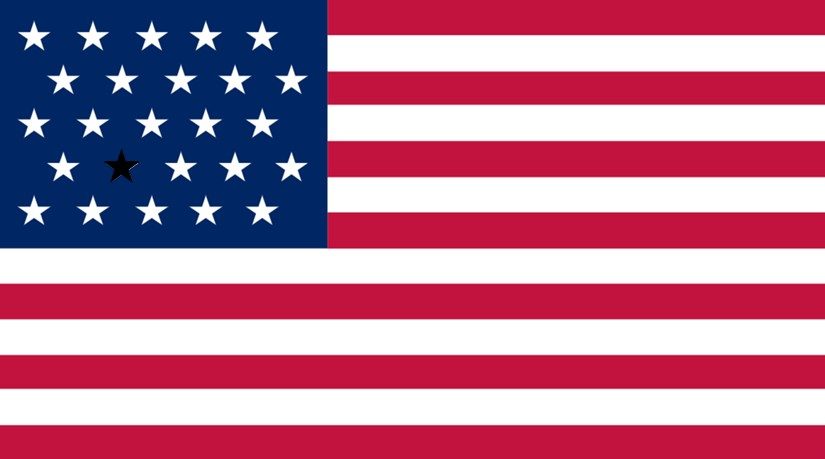Democratic (constitutionalist) President Jackson, delivers his farewell address to the Union:
[T]here is a tendency on the part of this [g]overnment to overstep the boundaries marked out for it by the Constitution. Its legitimate authority is abundantly sufficient for all the purposes for which it was created, and its powers being expressly enumerated, there can be no justification for claiming anything beyond them. Every attempt to exercise power beyond these limits should be promptly and firmly opposed, for one evil example will lead to other measures still more mischievous; and if the principle of constructive powers or supposed advantages or temporary circumstances shall ever be permitted to justify the assumption of a power not given by the Constitution, the [g]eneral [g]overnment will before long absorb all the powers of legislation, and you will have in effect but one consolidated government.
. . . . . . .
Plain as these principles appear to be, you will yet find there is a constant effort to induce the General Government to go beyond the limits of its taxing power and to impose unnecessary burdens upon the people. Many powerful interests are continually at work to procure heavy duties on commerce and to swell the revenue beyond the real necessities of the public service, and the country has already felt the injurious effects of their combined influence. They succeeded in obtaining a tariff of duties bearing most oppressively on the agricultural and laboring classes of society and producing a revenue that could not be usefully employed within the range of the powers conferred upon Congress, and in order to fasten upon the people this unjust and unequal system of taxation extravagant schemes of internal improvement were got up in various quarters to squander the money and to purchase support.
. . . . . . .
The Constitution of the United States unquestionably intended to secure to the people a circulating medium of gold and silver. But the establishment of a national bank by Congress, with the privilege of issuing paper money receivable in the payment of the public dues, and the unfortunate course of legislation in the several States upon the same subject, drove from general circulation the constitutional currency and substituted one of paper in its place.
. . . . . . .
The paper system being founded on public confidence and having of itself no intrinsic value, it is liable to great and sudden fluctuations, thereby rendering property insecure and the wages of labor unsteady and uncertain. The corporations[sic] which create the paper money can not [sic] be relied upon to keep the circulating medium uniform in amount. In times of prosperity, when confidence is high, they are tempted by the prospect of gain or by the influence of those who hope to profit by it to extend their issues of paper beyond the bounds of discretion and the reasonable demands of business; and when these issues have been pushed on from day to day, until public confidence is at length shaken, then a reaction takes place, and they immediately withdraw the credits they have given, suddenly curtail their issues, and produce an unexpected and ruinous contraction of the circulating medium, which is felt by the whole community. … Some of the evils[sic] which arise from this system of paper press with peculiar hardship upon the class of society least able to bear it. A portion of this currency frequently becomes depreciated or worthless, and all of it is easily counterfeited in such a manner as to require peculiar skill and much experience to distinguish the counterfeit from the genuine note.
. . . . . . .
Recent events have proved that the paper-money system of this country may be used as an engine to undermine your free institutions, and that those who desire to engross all power in the hands of the few and to govern by corruption or force are aware of its power and prepared to employ it. Your banks now furnish your only circulating medium, and money is plenty or scarce according to the quantity of notes issued by them. While they have capitals not greatly disproportioned to each other, they are competitors in business, and no one of them can exercise dominion over the rest; and although in the present state of the currency these banks may and do operate injuriously upon the habits of business, the pecuniary concerns, and the moral tone of society, yet, from their number and dispersed situation, they can not [sic] combine for the purposes of political influence, and whatever may be the dispositions of some of them their power of mischief must necessarily be confined to a narrow space and felt only in their immediate neighborhoods.
. . . . . . .
The severe lessons of experience will, I doubt not, be sufficient to prevent Congress from again chartering such a monopoly, even if the Constitution did not present an insuperable objection to it. But you must remember, my fellow-citizens, that eternal vigilance by the people is the price of liberty, and that you must pay the price if you wish to secure the blessing. … The power[sic] which the moneyed interest can exercise, when concentrated under a single head and with our present system of currency, was sufficiently demonstrated in the struggle made by the Bank of the United States. {emphasis added)
[added 2/19/2021]
Democratic President Jackson turns the presidency over to Democratic Vice President Martin Van Buren. Jackson is giving to Van Buren a federal debt that has contracted from 7,000,000 to 340,000 Dollars, going from 1 to 0.02% of the Gross National Product, and from 60 to 2 Cents per person.
NOTE: The Union is paying for these minimally incidental federal borrowings through lawful Indirect (tariffs and excise) taxes placed upon manufactured goods.
[added 2/19/2021]
Subsequent Events:
Authority:
Article II, Section 1 [Clause 8]
ccc-2point0.com/constitution-for-the-united-states
Article XII of Amendment
ccc-2point0.com/constitution-for-the-united-states
References:
Irony Andrew Jackson On a Federal Reserve Note « Speak Truth 2 Power
spktruth2power.wordpress.com/2010/01/28/irony-andrew-jackson-on-a-federal-reserve-note/
Government – Historical Debt Outstanding – Annual 1790 – 1849
www.treasurydirect.gov/govt/reports/pd/histdebt/histdebt_histo1.htm
List of Presidents of the United states – Wikipedia, the free encyclopedia
en.wikipedia.org/wiki/List_of_Presidents_of_the_United_States
Measuring Worth – GDP result.
www.measuringworth.com/datasets/usgdp/result.php
Bureau of Economic Analysis is an agency of the U.S. Department of Commerce.
www.bea.gov/national/index.html#gdp
Leviathan on the Right (How Big-Government Conservatism Brought Down the Republican Revolution) | Strike-The-Root: A Journal Of Liberty
www.strike-the-root.com/71/lfb/lfb1.html


